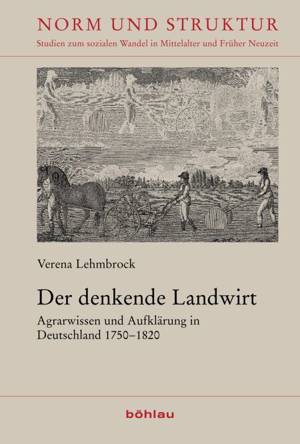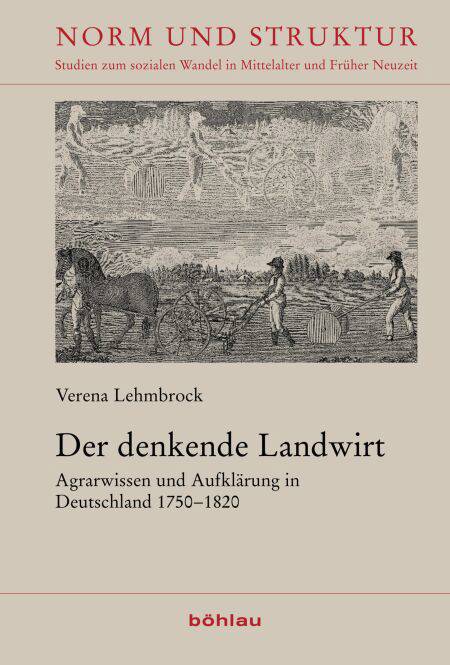
- Retrait gratuit dans votre magasin Club
- 7.000.000 titres dans notre catalogue
- Payer en toute sécurité
- Toujours un magasin près de chez vous
- Retrait gratuit dans votre magasin Club
- 7.000.0000 titres dans notre catalogue
- Payer en toute sécurité
- Toujours un magasin près de chez vous
45,00 €
+ 45 points
Format
Description
Landwirtschaft war im 18. Jahrhundert ein Modethema, ihre vermeintlich mechanische Praxis schickte sich jedoch nicht für die »höheren Stände«. Angehörige einer aufstrebenden Mittelschicht bereiteten vor, was sich dann nach der Wende zum 19. Jahrhundert durchsetzte: eine Wissenschaft, die auch Hand anlegt. Das aufklärerische Projekt einer wissenschaftlichen Landwirtschaft war zunächst literarisch: Als »wissenschaftlich« galt im 18. Jahrhundert vor allem die systematische Aufbereitung vorhandenen Wissens in Texten und Vorträgen. Dass Gelehrte selbst den Pflug führten, lag außerhalb des Vorstellbaren, doch nach Jahrzehnten intensiver Debatten geschah das vormals Unerhörte: Albrecht Daniel Thaer zog mit seiner Lehranstalt aufs Land, Gelehrte standen auf dem Acker. Die Studie zeichnet den Umbruch zwischen enzyklopädisch-klassifizierender und empirisch-forschender Wissenspraxis am Beispiel der Frühgeschichte der Agrarwissenschaft nach. In historisch-semantischen Feinanalysen arbeitet die Autorin eindrucksvoll die Verquickung zwischen geltender Sozialordnung und Wissenschaftsverständnis heraus. In den konzeptuellen Grundlagen der Thaer'schen Landwirtschaftslehre, die erstmals nicht als Ursprung, sondern als Produkt einer vorherigen Entwicklung interpretiert wird, erkennt sie die Spuren des sozialen Wandels. The farmer as thinker. Agrarian knowledge and science in the German Enlightenment. This book is a contribution to the social and conceptual history of knowledge. It focuses on the most ubiquitous and yet little researched branch of technical knowing in early modern Europe: agriculture. Drawing on a vast body of positions ranging from the peasant writer to the cameralist scholar, the study excavates the tacit hierarchies and implicit values of knowledge attached to what was regarded the most mechanical of all mechanical arts. While the improvement of farming techniques and production became a fashionable topic for middle class groups during the eighteenth century, the supposedly mechanical character of agricultural practice continued to constitute a tabooed area for people of higher rank. By analyzing the ways of dealing with social and cultural stumbling blocks, the author traces the intricate entanglements between concepts of knowledge and contemporary social order. This book not only helps us to understand why the project of a scientific agriculture largely remained a bookish knowledge practice until the watershed period around 1800. It also decenters the heroic figure of Albrecht Daniel Thaer whose influential doctrine of 'rational agriculture' famously required scholars to stand in the field themselves and brought an empirical understanding of agricultural science to general acceptance. This book shows how the members of a rising middle class were engaged for decades in laying the groundwork that allowed Thaer's innovations to come into being. Instead of conceiving Thaer as the sole vanishing point this book therefore highlights the contributions of hitherto neglected historical actors as well as the role of peasant forms of knowledge in the history of modern agricultural science. The book is written in German but contains a comprehensive English summary.
Spécifications
Parties prenantes
- Auteur(s) :
- Editeur:
Contenu
- Nombre de pages :
- 309
- Langue:
- Allemand
- Collection :
Caractéristiques
- EAN:
- 9783412517960
- Date de parution :
- 07-06-20
- Format:
- Ebook
- Protection digitale:
- /
- Format numérique:

Les avis
Nous publions uniquement les avis qui respectent les conditions requises. Consultez nos conditions pour les avis.






